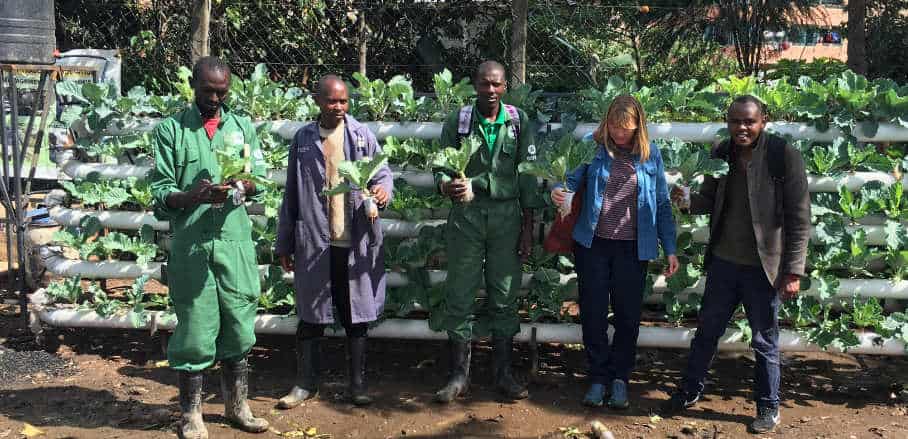From Trash to Treasure: Korogocho’s Food Waste Champions
Explore Nairobi’s dynamic markets with Joy Carey and Sam Ikua, where waste undergoes a remarkable transformation. These champions not only reshape the narrative around waste but also address issues of food and hunger, driving innovation and leaving a lasting impact on the community.
Korogocho, meaning “crowded shoulder-to-shoulder” in Swahili, stands as the fourth largest informal and densely populated settlement in Nairobi. Last year, Africanews highlighted the increased use of woven plastic bags in Korogocho, replacing costly charcoal for household cooking fuel despite the dangerous consequence of poisonous fumes.
However, over the past few years, the collaboration between Nairobi City County (NCC), FAO and OXFAM Kenya has been instrumental in building capacity amongst youth and market traders from Korogocho Market. The goal is to empower these new food waste champions to earn a living by creating sellable products from recycled market food waste and contributing to the management of market food waste.
The Korogocho Food Waste Management Champions launched their activities in April 2022 with the ambitious aim of reducing market food waste by 50 per cent. This reduction translates to a decrease in the volume sent to the nearby and infamous Dandora landfill or simply dumped into the local river. With over 100 members, 46 women and 56 men, their motivations include fostering a cleaner environment, job creation and income generation, transformation of waste into useful products, keeping young people productively positive, creating inputs for Urban Agriculture and increasing food security. The group currently processes about three tonnes of food waste per week (500kg per day) but this could significantly increase with greater physical space and processing capacity.
Transformative Revolution: Korogocho’s Champions Redefine Waste Management
The champions have been trained in diverse food waste recovery and recycling techniques such as composting, vermiculture, and crafting innovative products like fuel briquettes from banana leaves and artificial firewood out of avocado stones. They have embraced urban agriculture technologies like hydroponics, growing kale using liquid from vermiculture. Beyond recycling, they have turned food waste into culinary innovation, producing yoghurt, extracting avocado oil, making tomato juice and paste, toothpaste, smoothies, mango jam; crisps from arrowroot, sweet potatoes, banana, and cassava.

Compost making and drying of banana leaves on the fence. © Sam Ikua, Mazingira Institute
They have also learnt to farm the Black Soldier Fly for poultry feed and create soap from potatoes, carrots, aloe vera, avocado and turmeric. Polymerisation, used to create poles from waste plastics, showcases their commitment to sustainability and resource maximisation. In Korogocho, these champions aren’t just reducing waste; they’re leading a transformative revolution, turning every scrap into a valuable resource.
In terms of income generation, the group is earning Ksh 10-15,000 (€60-90) per month from selling products in the market and at other occasional events.
Recently awarded a national prize for their enterprise, the group is immensely proud of the tangible effects of food waste management in the market so far – specifically, a reduction of overall waste in the market area with no more dumping of food waste from market traders into the nearby river.
Navigating Challenges: Pragmatic Solutions for Market Waste Management
Facing current challenges and looking to the future, the group representatives exhibit both a pragmatic and ambitious approach. Limited space and infrastructure hinder effective market waste management, while the absence of standardised production complicates marketing efforts, especially for consumable products like yoghurt.

Dried banana leaf briquettes and dried avocado stones for making artificial firewood. © Sam Ikua, Mazingira Institute
Electricity costs for some of the recycling processes loom large, coupled with a need for increased mechanisation to boost efficiency. Further training in machinery maintenance and repair, financial management, branding, and marketing of products is essential.
The champions are keen to learn about power generation using food waste, tap into solar energy and biogas production for self-sustaining recycling, and gain crucial food safety training to enhance the value of new edible products.
Their future aspiration is revolutionary – achieving zero waste in the market. Simultaneously, they aim to leverage innovation and technology to make products that will help eradicate poverty and usher tangible changes to the local environment for the community’s benefit. To achieve this ambitious vision, they are on the lookout for partners who will help with start-up capital enabling them to upscale their fledgling enterprise.
Community Power: Turning Waste Reduction into Resilience
The potential here is nothing short of extraordinary, fuelled by an abundance of motivation, enthusiasm, energy, knowledge, and skill. These young innovators are ready to leap forward and are eagerly seeking investment to not only grow within their market but also replicate their success in markets all across the city. Picture a network of self-sustaining businesses, possibly operating as a cooperative, creating a ripple effect of positive change.
While the support from NGOs is good, the Korogocho Food Waste Management Champions would ideally attract local, ethical partners who fully understand their social entrepreneur world. This isn’t just a business; it’s a community-based social enterprise with the power to make a significant difference on the ground. It has the potential to play a crucial role in reducing waste in a way that builds resilience and addresses issues of food insecurity and hunger at the same time. Anchoring these operations and benefits within the local economy makes perfect sense, ensuring that the community reaps the rewards.
To guarantee genuine enterprise ownership, direction, autonomy, and control for these talented young people an alternative approach could involve the citizens of Nairobi becoming investors. By pre-purchasing products using a model like community asset vouchers, aligned with a local circular economy business model, this could solidify community support and propel this initiative to new heights.
